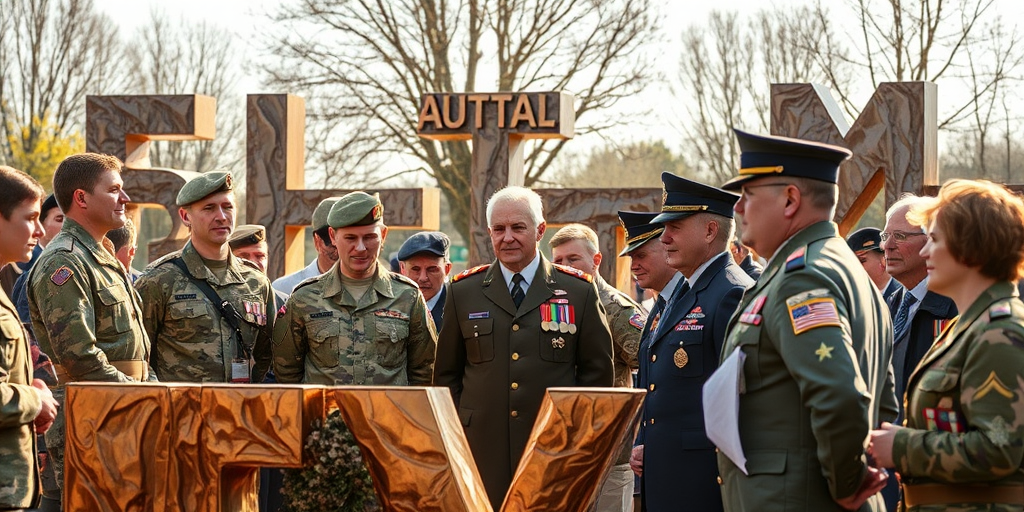King Charles III Dedicates Britain’s First National Memorial to LGBTQ+ Troops
King Charles III has inaugurated Britain’s first national memorial dedicating honor and recognition to LGBTQ+ military personnel. On October 27, 2025, at the National Memorial Arboretum in Alrewas, Staffordshire, the historic ceremony unfolded, giving tribute to lesbian, gay, bisexual, and transgender troops, honoring their contributions and sacrifices 25 years after the end of a ban on homosexuality in the British military.
A Monument of Remarkable Significance
The newly unveiled memorial stands as a poignant reminder of a tumultuous chapter in the United Kingdom’s military history. The monument takes the form of a crumpled bronze letter, etched with testimonies from those directly affected by the erstwhile ban. This symbolic structure highlights the journey from enforced silence and discrimination to the recognition and respect now being afforded to the LGBTQ+ personnel who served under oppressive regulations.
The ban, enforced between 1967 and 2000, labeled many soldiers, sailors, and air force personnel as unfit to serve if identified or assumed to be homosexual or transgender. These individuals faced dismissal, discharge, or were stripped of their medals and pension rights, impacting them both professionally and personally.
A Long-Overdue Apology and Restitution
The turning point arrived with a 1999 European Court of Human Rights ruling, leading to the lifting of the ban. In a significant move, 2023 saw former Prime Minister Rishi Sunak issue a formal apology for the discrimination faced by LGBTQ+ service members. Accompanying the apology, a compensation program was established, providing affected veterans with up to £70,000 (approximately $93,000) to acknowledge past injustices.
Brigadier Clare Phillips, reflecting on the military’s evolution, expressed, “As a gay woman having served for 30 years, my journey shifted from secrecy and darkness to pride and openness. This memorial stands testament to those who battled persecution, allowing us to serve openly and proudly today.”
LGBTQ+ Charity and Veterans’ Reflections
Fighting with Pride, an LGBTQ+ military charity, lauded the memorial as a “powerful step forward in recognizing and honoring the service and sacrifices” of gay and transgender troops. The acknowledgment from a charity dedicated to supporting LGBTQ+ military community marks a pivotal development in recognizing historical wrongs and promoting inclusion in the armed forces.
Former Royal Artillery member Claire Ashton, who was pushed out in 1972, shared profound emotions at the memorial’s dedication. “I’ve carried the scars of my ordeal, but today signifies healing—a shared moment of reconciliation with others who endured similar nightmares.”
Local Impact and Community Interest
For residents of the UK and its Commonwealth, this memorial resonates with local communities, serving as a reminder of progress and an encouragement for inclusivity and equality. As the UK’s military history interlocks closely with American alliances, British armed forces’ strides in inclusivity reverberate powerfully across the Atlantic, especially in light of ongoing discussions around diversity within the U.S. military.
Local experts note the significance of this moment in aiding younger generations to comprehend the struggles fought in paving the way for a more inclusive military—a message that resonates across institutions battling similar issues worldwide.
Future Implications
While the memorial rightfully focuses on past wrongs, it also holds the torch of future possibilities, encouraging continuous progress toward equality not only in military ranks but across different spheres of society. Shedding light on historical injustices opens pathways to more inclusive policymaking and serves as a pertinent reminder to ensure such discrimination does not recur.
The British military’s transformation from its earlier policies to its current stance sets a benchmark for societies aiming to integrate diversity and reshape their respective legacies toward justice and rightful recognition.
Balanced Perspectives
It is crucial, however, to approach such topics bearing balanced perspectives, acknowledging the complexities and potential areas for ongoing reflection and improvement. While this dedication stands as a milestone, continuing dialogues about inclusivity in wider societal contexts remain critical.
Residents and community members impacted by the history or those simply interested in learning more are encouraged to engage with local resources and conversations surrounding the evolution of military policies.
For further community support or information, local military archives and LGBTQ+ support resources offer channels to delve deeper into this momentous shift and how similar practices can benefit various societal structures.
In dedicating Britain’s first national memorial to LGBTQ+ troops, King Charles III not only cements his legacy of progressive leadership but also propels the momentum toward wider acceptance and dignity for those who have long served in silence. This dedication stands as a beacon of hope for a future where equality transcends boundaries, enriching and affirming the communities it serves.







